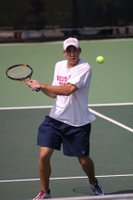 Since childhood, I have preferred people with foreign accents.
Since childhood, I have preferred people with foreign accents. I believe accents adds dignity and character to, well, both of us. I was, after all, a modern American young person representing the future, and you were the old world, obligated to teach me it all. It was a crucial relationship to make up for the shortcomings of my 'situation' until I could correct it.
Manhattan was over thirty minutes and thirty miles away from Springfield, and our town's diversity was best illustrated by three different synagogues -- one each for Reform, Conservative and Orthodox. There was a small population of black people, who for some reason lived among four streets, which formed the "Square" on the south side of town. But mostly it was a town of Italians, Irish, WASPs, and Jews. Interesting in the fifties maybe when the town of split-levels was built in a day, but boring for 1978, when I started to crave the world outside.
My friends' parents from other places were my temporary outlet: just talking to them made me feel cosmopolitan. I wanted to drink coffee with them, to talk about art and literature and tell them I was taking French. Nate's parents, for example were from Romania, and there were times when I could barely and happily understand a word they said. Roger's mother was from Hungary, and when he would do something wrong, which was gratefully often, I could hear her yell Rogah!. He was embarrassed,but I was thrilled. Bland's parents were from China, and she taught me to drink hot tea during tennis practice, which showed you that it was more than accents. Chickie's mom was Danish, which I explained to my camp friends is a completely different country than Holland. And no, Pennsylvania Dutch is not Dutch, but a bastardization of German, which anyone who has ever traveled (in their mind or by aeroplane) knows is Deutsch. There were things to
learn. And looking around their houses with sculpture, paintings, books and music, there things to see and hear.
Come to think about it, most of my friends were first-generation Americans. Diversity to me wasn't race or religion; it was nations. Curiously, Northern European, but still. And in Springfield in the seventies and eighties, it was a start. I really despised my own homogeneity and would quiz my mother for some background element to add color to what a gray and predictable northern European stock. From Poland and Russia who fled the shtetl at the turn of the century. They learned English quickly. Blah, blah. I wasn't even Sephardic, which would be interesting at Passover.
My friends didn't like it, of course. They were embarrassed by their parents' accents. Besides, in our teenager years, the idea was to avoid interaction with adults, not talk to them for more than two minutes in passing. We were too busy lying to them about where we were going. We had sleepovers with girls, we would drive into New York, we would sneak into a local bar.
Eventually, it didn't matter. I would start to travel. To Europe any chance I could, and then, finally, with every stomach and allergy medicine I could fit in my bag, to China.
 Bryan told me about this Amazon.com Short Story Contest through Gather.com, so I entered a story I've been working on called, "The World's Most Famous Colorist." It's only up through Sept 13th, so please go today to join (it's free) read, and hopefully vote. It's sortof a flickr/myspace/squidoo for writing.
Bryan told me about this Amazon.com Short Story Contest through Gather.com, so I entered a story I've been working on called, "The World's Most Famous Colorist." It's only up through Sept 13th, so please go today to join (it's free) read, and hopefully vote. It's sortof a flickr/myspace/squidoo for writing.








